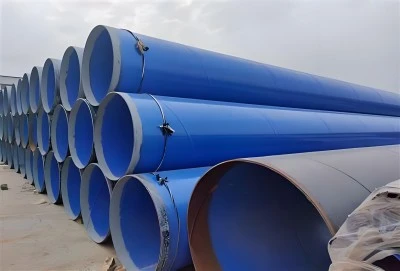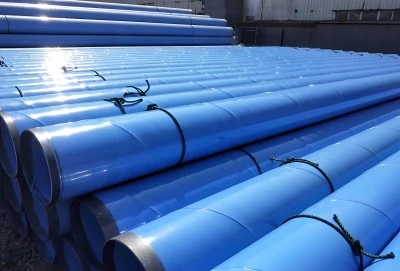From corrosion resistance to extended service life, epoxy coated steel gas pipes provide numerous advantages that make them the preferred choice for pipeline engineers, project managers, and contractors worldwide. Let's dive into the key benefits that make these pipes essential for modern gas infrastructure projects.
|
|
|
Corrosion Resistance (Primary Benefit)
The primary advantage of epoxy coated steel gas pipes lies in their exceptional corrosion resistance. This crucial feature significantly enhances the longevity and reliability of gas pipeline systems, making them indispensable in various challenging environments. The epoxy coating acts as a robust barrier, shielding the steel substrate from corrosive elements that could otherwise compromise the pipe's integrity.
Protection Against Harsh Environmental Factors
Epoxy coated steel gas pipes excel in withstanding harsh environmental conditions. Whether installed in coastal areas with high salt content, regions with extreme temperature fluctuations, or areas prone to acid rain, these pipes maintain their structural integrity. The epoxy coating forms a seamless protective layer that resists degradation from UV radiation, moisture, and atmospheric pollutants. This resilience ensures that the gas pipeline network remains operational and safe, even in the most demanding environments.
Minimizing Impact of Chemical Exposure on Steel Pipes
In the gas transportation industry, pipes are often exposed to various chemicals, both internally and externally. Epoxy coatings provide an effective barrier against chemical attack, preventing direct contact between corrosive substances and the steel surface. This protection is particularly valuable in industrial zones or areas with contaminated soil, where aggressive chemicals could rapidly deteriorate unprotected steel pipes. By minimizing the impact of chemical exposure, epoxy coated steel gas pipes maintain their structural properties and ensure the safe, uninterrupted flow of gas.
Long-Term Durability in Diverse Soil Conditions
Soil conditions play a critical role in the lifespan of underground gas pipelines. epoxy coated steel gas pipes demonstrate remarkable durability across a wide range of soil types, from acidic to alkaline, and from dry to waterlogged environments. The coating's impermeability to moisture and resistance to soil-borne microorganisms significantly reduces the risk of underground corrosion. This enhanced durability translates to fewer replacements, reduced maintenance needs, and improved overall performance of the gas distribution network over extended periods.
Extended Service Life
One of the most compelling advantages of epoxy coated steel gas pipes is their significantly extended service life. This longevity not only ensures the reliability of gas supply systems but also offers substantial economic benefits to operators and stakeholders in the long run. The robust protection provided by the epoxy coating allows these pipes to outlast their uncoated counterparts by a considerable margin, making them a wise investment for large-scale infrastructure projects.
Reducing Maintenance Costs for Gas Pipeline Systems
The extended service life of epoxy coated steel gas pipes directly translates to reduced maintenance costs. Traditional steel pipes often require frequent inspections, repairs, and replacements due to corrosion and wear. In contrast, epoxy coated pipes maintain their integrity for much longer periods, minimizing the need for costly maintenance interventions. This reduction in maintenance frequency not only saves on direct repair costs but also minimizes operational disruptions, ensuring a more consistent and reliable gas supply. For project managers and plant equipment managers, this means lower lifecycle costs and improved budget allocation for other critical aspects of gas infrastructure management.
Enhancing Pipe Performance in High-Pressure Applications
Gas transportation often involves high-pressure systems, where pipe performance is crucial for safety and efficiency. Epoxy coated steel gas pipes excel in these demanding applications, maintaining their structural integrity and protective properties even under significant pressure. The coating's ability to resist abrasion and impact damage ensures that the pipes can withstand the stresses associated with high-pressure gas flow without compromising their protective layer. This enhanced performance capability allows for more efficient gas transportation, potentially enabling the use of higher operating pressures and improving overall system capacity.
Preventing Premature Failure of Steel Gas Pipes
Premature pipe failure can have catastrophic consequences in gas transportation systems, leading to leaks, explosions, and significant environmental damage. Epoxy-coated steel gas pipes dramatically reduce the risk of such failures by addressing the root causes of pipe deterioration. The coating prevents corrosion initiation, slows crack propagation, and resists material degradation, effectively extending the pipe's useful life. For structural engineers and project procurement managers, this means greater confidence in the long-term reliability of their gas pipeline infrastructure, reducing the likelihood of unexpected failures and associated costs.
Enhanced Safety for Gas Systems
Safety is paramount in the gas transportation industry, and epoxy coated steel gas pipes play a crucial role in enhancing the overall safety of gas distribution systems. The robust protection offered by these pipes significantly reduces the risks associated with gas leaks, structural failures, and environmental contamination. This enhanced safety profile not only protects human lives and the environment but also ensures compliance with increasingly stringent industry regulations.
Mitigating Risks of Gas Leaks in Pipeline Networks
Gas leaks pose one of the most serious threats in pipeline networks, with potential for explosions, fires, and environmental damage. Epoxy coated steel gas pipes substantially mitigate these risks by providing a highly effective barrier against corrosion and material degradation, which are common causes of leaks. The coating's resistance to cracking and its ability to withstand mechanical stresses help maintain the pipe's integrity, even in challenging operating conditions. For pipeline engineers and safety managers, this means a significant reduction in the likelihood of gas escapes, enhancing the overall safety and reliability of the gas distribution infrastructure.
Improving Structural Integrity for Underground Installations
Underground gas pipelines face unique challenges, including soil stress, ground movement, and exposure to groundwater contaminants. Epoxy-coated steel gas pipes excel in maintaining their structural integrity in these demanding environments. The coating's flexibility allows it to withstand soil settlement and seismic activities without cracking or separating from the steel substrate. This resilience ensures that the pipes remain leak-tight and structurally sound, even in areas prone to geological instability. For large-scale engineering contractors working on underground gas infrastructure projects, this improved structural integrity translates to more reliable and durable pipeline systems.
Ensuring Compliance with Industry Safety Standards
The gas industry is subject to rigorous safety standards and regulations, which are continually evolving to address new challenges and technological advancements. Epoxy coated steel gas pipes are designed and manufactured to meet or exceed these stringent requirements. The coating's properties, including its chemical resistance, impact strength, and adhesion to steel, are thoroughly tested to ensure compliance with international standards such as API 5L, ISO 21809, and NACE SP0394. For project managers and procurement specialists, choosing epoxy coated pipes simplifies the process of meeting regulatory requirements and obtaining necessary certifications for gas transportation projects.
Epoxy coated steel gas pipes offer a comprehensive solution to the challenges faced in gas transportation and distribution systems. Their superior corrosion resistance, extended service life, and enhanced safety features make them an invaluable asset for pipeline engineers, project managers, and contractors in the oil and gas industry. By choosing these innovative pipes, companies can ensure the longevity, reliability, and safety of their gas infrastructure while minimizing maintenance costs and environmental risks. As the industry continues to evolve, epoxy coated steel gas pipes stand out as a testament to the power of advanced materials in addressing the complex needs of modern gas transportation systems.
Epoxy Coated Steel Gas Pipe For Sale
Hebei Longma Group offers top-quality epoxy coated steel gas pipes, leveraging advanced production equipment imported from Germany and independently developed technologies. Our team of over 300 employees, including 60+ technical experts, ensures superior product quality and innovation. We employ comprehensive testing facilities, including ultrasonic flaw detectors and industrial X-ray equipment, to guarantee pipe integrity. With fast delivery times as short as 7 days for standard thickness pipes and complete certification including API 5L and ISO 9001, we meet global industry standards. Our competitive pricing is achieved through long-term partnerships with raw material suppliers and efficient production processes. For epoxy-coated steel gas pipes meeting API 5L, ASTM A53, EN10210, and AS/NZS 1163 standards, with coating compliant with DIN 30670, DIN30678, CSAZ245.20, EN10339, ISO21809-1, AWWAC210, and C213, in diameters from 60.3-1422mm and wall thicknesses of 6.02-50.8mm, contact us at info@longma-group.com.














